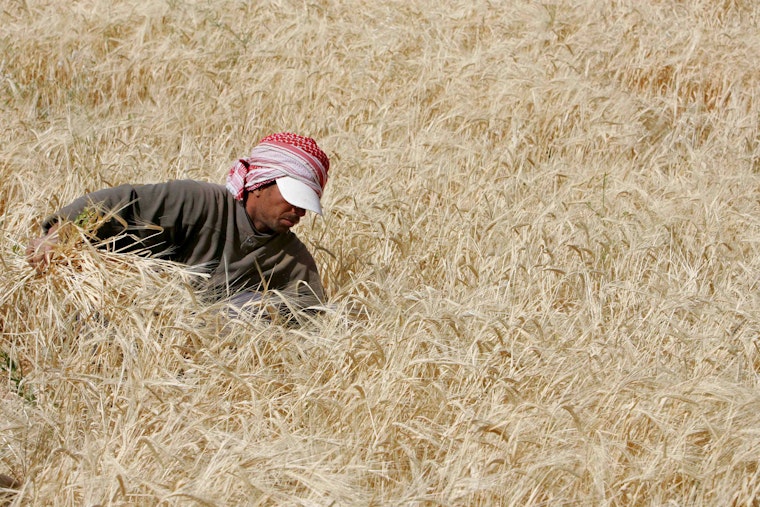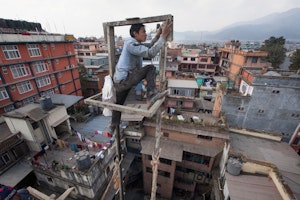For Exploited Migrant Workers, a Good Lawyer Can Make All the Difference
By Linda Kalash

When Hamadeen Najdi, a migrant agricultural worker in Jordan, was arrested for not renewing his work permit, he ended up held in detention for 13 months without being referred to a judge.
It was a stunning miscarriage of justice that occurred through no fault of Najdi’s own. His employer was responsible for renewing his permit but, after an argument, decided to terminate it instead. In detention, Najdi launched a hunger strike and was eventually released. But the physical, psychological, and financial tolls were steep. He had lost five years of savings and was facing imminent deportation.
Seeking redress, Najdi approached Tamkeen Fields for Aid, a Jordanian NGO that fights to protect migrant workers’ rights. Working with Tamkeen, he filed a lawsuit against the minister of the interior, the manager of public security, and the governor of Amman. In an unprecedented decision, the Amman Magistrates Court ruled in favor of Najdi, saying the arbitrary detention violated both domestic and international law, and ordered a compensation payment of $2,850.
The ruling, the first of its kind in Jordan and likely the region, held the government responsible for violations against a migrant worker—a giant step forward that demonstrated how strategic litigation can secure the rights of migrants. Recent legislation has also raised the minimum wage and granted one day off a week for workers, adding up to significant improvements to their lives and livelihoods.
Yet despite recent labor code enhancements and some progressive court rulings, nearly one million guest workers in Jordan remain marginalized and vulnerable to discrimination and abuse due to gaps in legislation and failure to enforce new laws. Many have reported having their passports and salaries withheld or being subject to extreme working conditions.
Most don’t speak Arabic and are unfamiliar with the legal system. (While the majority of Jordan's migrant workers are from Egypt, most of the domestic workers are from Sri Lanka, Indonesia, the Philippines, and other parts of Southeast Asia.) Translators, offered by the court, are inadequate, and embassies frequently refer workers back to their recruitment agencies, which are more likely to perpetuate the problem than fix it.
Guest workers who do try to submit an official complaint at a police station often face legal repercussions. For instance, employers preemptively file “runaway” notifications against domestic workers so they will be arrested before they can file a statement. Those that actually get their cases heard in court don’t fare much better. Cases regarding unpaid salaries can languish in the legal system for years, during which time a worker’s visa may expire, leaving them with the responsibility of paying overstay fees, which are generally higher than the salary they were fighting for.
In our research, we found that bad practices by law enforcement and public security have accounted for many of these injustices. We examined police reports and discovered that the police were mistaking victims of human trafficking for domestic workers without valid residency permits. As a consequence, young women were being imprisoned and fined, without any proper investigation into human trafficking rings. These kinds of mistakes could have been avoided if police had followed basic questioning procedures.
Since its inception, the Tamkeen Fields for Aid has played a significant role in helping migrant workers get access to justice. We are committed to fostering an effective legal system that upholds domestic and international law as well as a community that is knowledgeable and confident of their rights. Our organization relies on strategic litigation, advocacy, and reporting as tools for securing rights and compensation.
We provide free legal services for the hardships faced by many migrant workers, from arbitrary detention and human trafficking to disputes over salaries and passports. These cases also raise awareness among Jordanian society, and employers specifically, about the rights afforded to migrants. It’s through this work that we have identified gaps in legislation around which we produce reports and draft laws to influence change.
Another critical component of our work is empowering the migrant community. Preparing migrant workers to file a complaint and allowing them to do so on their own—rather than simply doing it for them—gives them the opportunity to fend for themselves and, when they succeed, an invaluable sense of achievement.
By using strategic litigation and empowering the migrant community to find its voice, Tamkeen is paving the way toward a more inclusive and just society. Access to justice isn’t just about filing a complaint. It’s knowing that your complaint will be heard and your rights will be honored.
Tamkeen Fields for Aid is a grantee of the Open Society Foundations.
Linda Kalash is the executive director of Tamkeen Fields for Aid.

